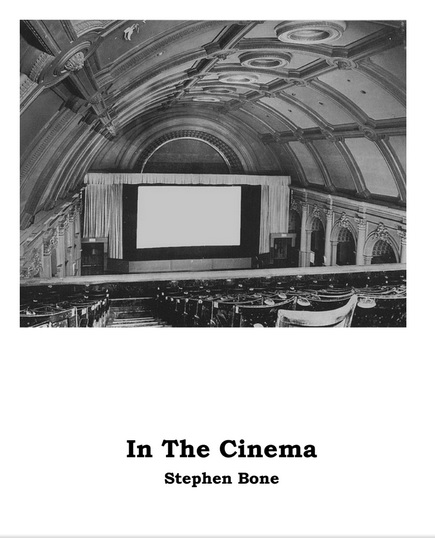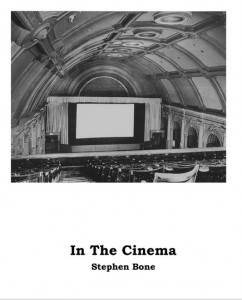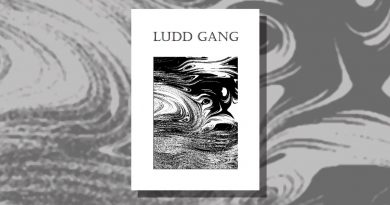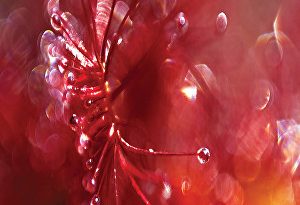In The Cinema by Stephen Bone
-Reviewed by Tom Crompton–
In The Cinema is in itself a private picture house, a careful framing of moments. In this collection Stephen Bone often undertakes a microscopic procedure, holding objects in certain lights, running films at specific speeds, cutting at definite moments.
‘Coal Tar’ is a good path in to the collection, with Bone taking an everyday object (coal tar soap in this instance) and holding a lens so close to it that the object itself ceases to matter and attention is instead directed to what emanates from it. At its most effective this method gives intricacies so exact that they are worth exploring in their absolute displacement and lack of significance to the reader, ‘Used to ease her father’s signet ring’, ‘and on me the time I slipped up’. This kind of study into otherwise meaningless facts is rewarded, the reader being let in on the secret significances that surround these things, equal parts endearing and intriguing in their exactitude. In an age where our objects and our bodies are equally disposable, ‘Coal Tar’ is a refreshing focus on the near to hand, the objects through which our experiences interlock. In this opening poem Bone treads the difficult line of making his object both personal/intricate and also accessible, allowing one to find their own history within a personal/mundane object.
However, in certain poems, ‘Pork’, ‘Vinyl’, ‘Red’ and ‘Silence’, this technique edges too far into prescription and ceases to really tell us anything new. Whilst newness is not a prerequisite for interesting poetry, the framing and reframing Bone executes so well in the opening two poems lacks effect, Bone at time simply explaining his title without giving much to latch onto/care about, ‘it’s the emergency’s pulsing flash’ (‘Red’), ‘it’s the lake your thoughts float on’ (‘Silence’). I feel at these points he almost tries to undertake too big a task, opting for objects/subjects that are too vague to map in the intriguingly personal style of the opening two poems. The more personal and ‘closed off’, the thing Bone works from, the more accessible his poems are and the deeper they resonate. He truly hits his stride when he works from physical particulars into wider cosmic ambiguities.
However, this isn’t always the case. ‘Miss’ is so effective for me due to the vagueness of the title against the nature of the poem itself:
Her hair immovably set; handbag
held like a weapon, her flint grey tweeds
worn even when it sweltered, perspiration
dampening her Yardley powder.
To cool herself she swore by tea, drunk
magma hot, the colour of creosote
Bone strikes on what really makes his writing tick in this section, the utilisation of his scouring detail and knack for anecdote given air to breath against the contrasting, ethereal title. Aside from this technique, Bone seems to, for want of a better phrase, take his time in ‘Miss’ and the results are enjoyable:
Each morning after porridge
or sometimes something reheated
I hadn’t managed, she walked me
to the bus stop
Bone really forces us to drag through his phrases, collecting every scrap of pollen from his carefully hung lines and breaks; the result is almost painful.
For me however, a real highlight of the collection is ‘Fritillary’. Bone seems to really dig his fingers into a honeypot in this piece, working and arranging the poem as space, delicately figuring language into tentative holds and associations,
Scrap of Turkish
carpet, October leaf;airborne
dancer riding fragrant
currentswith skip and dart;
pearled slurper
‘Fritillary’ is an act of delicate unpeeling, turning, dissecting of which Bone is completely in control, the poem turns spatial, a place to explore. In this poem I really sense that Bone himself also undertakes a certain exploration of his object/subject, a sense of play leaking through its nicks and gaps, the closing lines ‘if our reward/were this’ leading the reader into a second reading/negotiation of the poetic space in relation to oneself. ‘Sakura’ exhibits a similar deftness, jarred slightly off the mark of ‘Fritillary’ by the disruptive ‘but no/ expensive geisha/here’, an arrangement which clanks against the poem’s otherwise liquidity.
Stephen Bone’s picture show pitches from murk to crystallinity, fractures and stains to coherent sequence. We are left alone with a set of given fragments and forced to negotiate them, finding reflections in the gaps, the dark between scenes.





